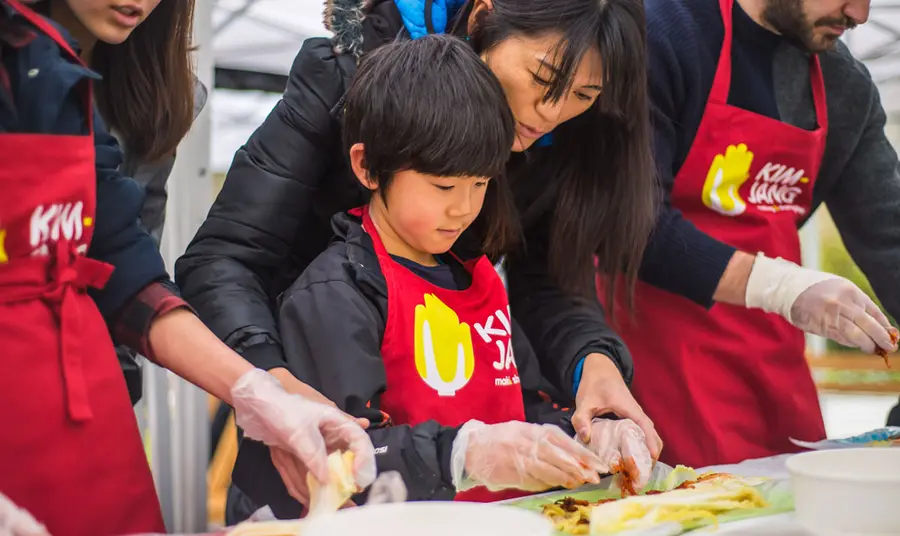
Our Heritage
The heritage
Kimchi is the national food of Korea, a traditional side dish of salted and fermented vegetables, with a history that dates back 3,000 years. Kimjang is the traditional practice of communally preparing and preserving kimchi to last through the winter.
Kimjang, Making and Sharing Kimchi aimed to gather the knowledge and experiences of first-generation Koreans in Kingston upon Thames – one of the largest South Korean communities in Europe – before it was too late.
Justina Jang, the project’s manager, says: “It’s so important to preserve, because all these people are getting old, and most of the young Korean communities in the UK don’t make kimchi anymore. Once the first generation is gone, the tradition is gone, the recipes are gone, the knowledge of the taste is gone.”
The organisation
The project was led by the Korean British Cultural Exchange. It’s a volunteer-run charity that promotes Korean culture through events and educational activities, to enhance understanding and build bonds between the communities.
The funding
Our £97,000 grant supported the recording and archiving of bilingual oral history interviews. The project documented 20 kimchi recipes and personal Kimjang experiences, which were brought together in a recipe book.
The project also launched the first Kimjang Festival to promote Korean culture and celebrate kimchi – a food which has grown in popularity beyond Korea in recent years.
The results
The stories and recipes are collected on the Kimjang Project website. It contains resources for understanding the history and process of Kimjang, including ‘how to’ videos.
The project also enabled North, South and Chinese-Korean women to make connections between their own communities and share their skills and experiences with the wider community.
In 2023, the Royal Borough of Kingston upon Thames declared 22 November as kimchi day, the first European city to make such a designation.
Meeting our outcomes
A wider range of people
The plan was to work with older women to preserve their unique knowledge and then make it available to others. But along the way, the project developed relationships with schools and actively involved young people through hands-on workshops.
They’d planned to share the cookbook with local schools and libraries, but the Korean Embassy was so impressed with it that they paid to produce an extra 500 copies to distribute themselves.
And while the pandemic meant the 2020 festival had to be moved online, Justina says this actually increased the amount of people the project reached. She’s had requests from audiences as far away as America for a copy of the recipe book.
The project website has now been archived by the British Library.
The future
2023 marks the fifth year of the Kimchi festival and coincides with the tenth anniversary of UNESCO recognising the intangible cultural heritage of Kimjang and kimchi. This year the festival will welcome one of Korea’s kimchi masters as a special guest. And for the first time, it will take place over two locations.
In future years, Justina hopes to expand the festival to even more locations across London.
Top tips
Research: the project came about following the rise in popularity of kimchi and the Korean British Cultural Exchange’s concern about its authenticity. It was through researching whether the ingredients and production of the kimchi being sold in the UK were correct, that Justina realised how valuable the heritage of Kimjang was and the need to preserve it.
Persuasion: not everyone will appreciate the importance of the heritage – sometimes not even those who are closest to it. “The older women didn’t value their skills because it was a common tradition that they’d always done. I had to persuade them that this distinctive part of our culture was important to preserve.”
Networking: Justina says the project was so successful because of the different communities they built relationships with. “It’s not something that you can do overnight, it’s going to take time, but it will pay off.”
Keep going and evolve: “Don’t be too strict about your ideas. You have to be prepared to adapt,” Justina says. Pivoting from an in-person event to an online one during the pandemic “created something even better and helped us reach and engage with more audiences than our original plan”.
